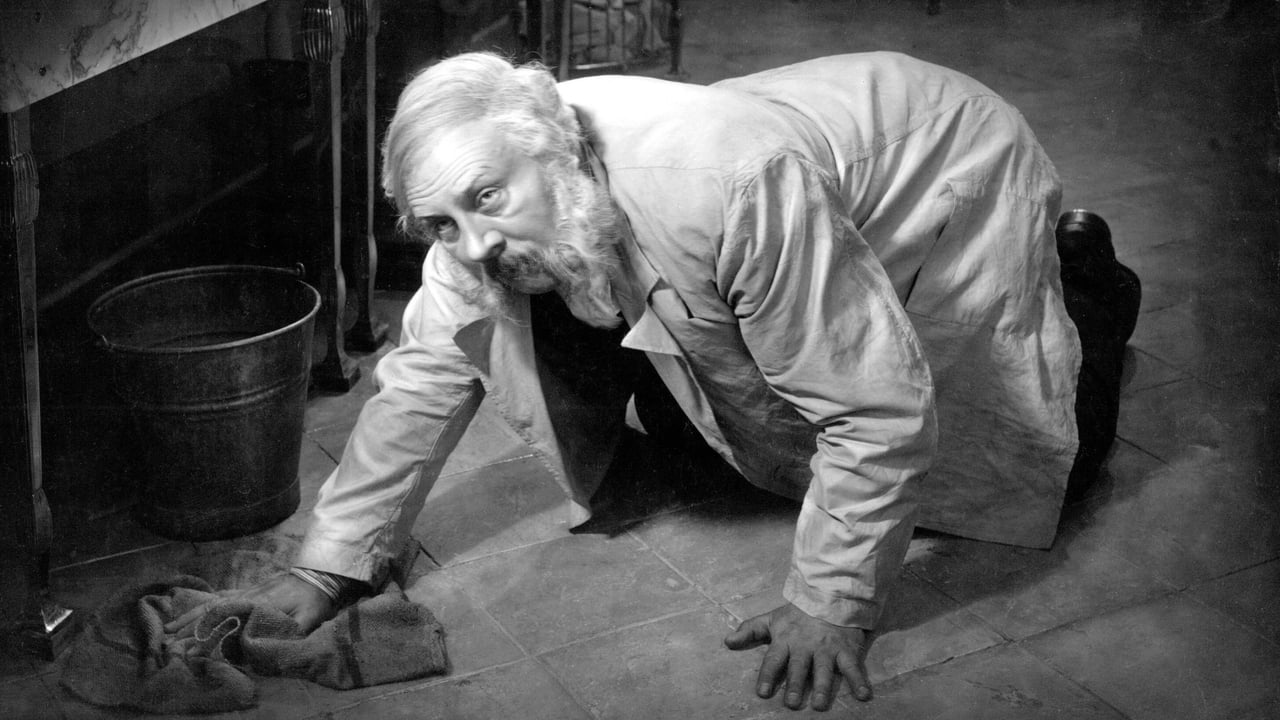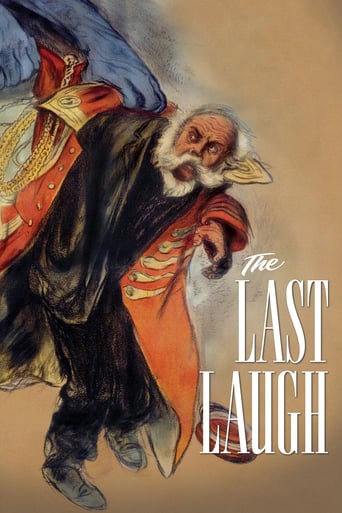

Watch something else. There are very few redeeming qualities to this film.
... View MoreIt is neither dumb nor smart enough to be fun, and spends way too much time with its boring human characters.
... View MoreThe storyline feels a little thin and moth-eaten in parts but this sequel is plenty of fun.
... View MoreThe story, direction, characters, and writing/dialogue is akin to taking a tranquilizer shot to the neck, but everything else was so well done.
... View MoreEmil Jannings is the doorman of the elegant Atlantic Hotel. He is proud of his uniform and function, and respected by his community. When he reaches the old age, he has difficulties to carry trucks and suitcases. The hotel manager decides to change his function to washroom attendant. This apparently simple action is enough to destroy him as a human being. He loses his self-respect and when his neighbor finds that he is janitor of the hotel, he loses the respect of his neighbors and friends. "Der letzte Mann", a.k.a. "The Last Laugh", is another masterpiece directed by F.W. Murnau. It is an authentic study of the vanity and cruelty of mankind. The gossip and lack of respect to the elders is also shown in this fantastic film. The performance of the great Emil Janning is top-notch and the plot is based on his character and corporal expressions. The talent of Murnau is impressive, since he changes the heartbreaking narrative and turns into a comedy, with the doorman receiving the inheritance of an America millionaire and becoming "the last laugh" of the title of the movie. My vote is ten.Title (Brazil): "A Última Gargalhada" ("The Last Laugh")
... View MoreYep. It's about a doorman. A fat, pompous doorman. A doorman that, because he's getting old, get's demoted to Washroom Attendent. Then he does washroom things. Sounds dry, but it's not.Emil Jannings play the lead (did I mention, doorman?). He carries the entire film in a masterful silent performance. Truly silent; not one dialog card in the entire movie.Direction, camera-work and lighting are all excellent.Could've been a masterpiece if not for a ridiculous deus ex machina ending. Not just a "didn't see that coming" ending, but a ending that is just absurd enough to ruin the integral mood of the first 80 minutes.If you like classic silents you should check this out. But you will leave unsatisfied if you want an emotional payoff.
... View MoreIn 1920s Germany, a hotel doorman takes great pride in both his job and the grand uniform that denotes his position. The uniform earns him the unquestioning respect of his neighbours, so when he is demoted through no fault of his own to the lowly position of lavatory attendant, the doorman is devastated. Stealing the uniform that once was his, he makes a sad attempt to fool his neighbours into thinking he still manages the door of the prestigious Atlantic Hotel but, before long, the truth is uncovered, and the respect they once paid him quickly dissolves.The Last Laugh stands as one of the finest creations of a remarkable director, F.W. Murnau, whose credits include Nosferatu, Faust and Sunrise. Filmed without use of subtitles – and to appreciate what an astounding achievement this is, try imagining a dramatic film made without any form of dialogue today – Murnau crafts a beautiful, compelling and tragic tale that stands as both testimony to his undoubted skills and to the artistic heights to which silent cinema often aspired.The venerated German actor Emil Jannings was only 40 when he took on the role of the unnamed porter, and yet a combination of Waldemar Jabs painstaking make-up and Jannings' own ability to convey his character's heartache in simple ways, such as the stoop of his shoulders or a bent leg, means he gives a towering performance that never threatens, however, to overshadow the story being told.The story revolves as much around the grandiose uniform Jannings wears as it does the man. A symbol of the contemporary German importance attached to uniforms and their unavoidably militaristic connotations, the uniform is portrayed as making the man – and it is only the contentious ending that spins the message that it is not uniforms but compassion and kindness that make men great – not only through the respect he receives from all around him, but in the transformation the porter undergoes whenever he is parted from it. From a ramrod-backed creature of magnificence, with elaborately arranged hair and whiskers, he turns into a fumbling old man with bowed back and shaking hands. In the hands of a lesser actor, the demands of this transformation may have descended into cheap caricature, but Jannings never lets us lose sight of the proud man lurking within the bowed and beaten body.Karl Freund's camera-work is a revelation in this film, right from the opening shot as we descend with the lift into the foyer of the opulent Atlantic hotel. Numerous tricks are used without drawing attention to their use and thus distracting the viewer from the tragedy that is taking place: the drunken POV shot (achieved by strapping the camera to Freund's chest) in Jannings' flat after his niece's wedding reception; the blurred fantasy sequences (themselves a breakthrough in film narrative) achieved by smearing Vaseline onto the camera lens, and the use of dialectic montage and dolly shots, were all groundbreaking techniques never before used, but copied forevermore.Murnau directs the film with the assurance of a man at the top of his form – where he would arguably remain until his tragically early death – and the care taken with this film is evident throughout every shot. This is why Murnau made relatively few films in an era when many directors churned them out at a rate of a dozen or more per year. The degree of a director's conscientiousness is always evident on the screen, and it is always a pleasure to view a Murnau film, because it is clear that his commitment to his work was always second to none.
... View MoreThis is such a great- and even better told story. It features normal average persons who get in some realistic difficulties and struggle with life. You can just feel how heartbroken the old man is after loosing his job and the respect he had among the community because of his uniform. Yeah, uniforms were still a that big thing at that time. The movie especially does a good job with showing the contrasts between the 'two worlds', of money and respectability and poor and being just considered average, or even less. It makes "Der Letzte Mann" such a powerful and effective movie!I love it when a silent movie doesn't use too many or hardly any title cards. Just let the images tell the story. It takes a great director to do this but F.W. Murnau was obviously one of the best, not just of his time but of all time!The movie is filled with some greatly made and looking memorable sequences, such as a couple of great dream-like- and surrealistic sequences. In those sequences it becomes once all the more obvious how great of a director F.W. Murnau was.The movie is filled and even more uplifted by its fantastic camera-work! I love it when old movies use early movement-effects and pans and zooms, though obviously the movie doesn't use this all the time. Especially the beginning is memorable, when the movie opens with one of the first ever hand-held camera shots. It's different from the normal usual static camera-work from the '20's and '30's. But also the lighting of the movie is absolutely phenomenal. It gives the movie such a good, warm and effective powerful look. The same goes for the fast and nimble editing and compositions, that make the story flow extremely well. Old movies normally feel distant because of the old fashioned style and look. But not this one!The movie was obviously mostly shot at studios and the street sets look like they were made out of cardboard (which they most likely also were) but that is all part of the charm of these expressionistic German movies from the '20's, such as also "Metropolis", "Das Cabinet des Dr. Caligari" and "Faust".The make-up effects are perhaps an underrated aspect of the movie. I mean it's not a 'make-up' movie, such as "Nosferatu, eine Symphonie des Grauens" or "Faust" (both also directed by F.W. Murnau by the way) but remember that Emil Jannings was in his early 40's during this movie, though he truly looked like he was in his 60's or so. So some really effective and convincing make-up effects here! If you didn't knew any better you would just think that this movie had a 60 year old playing the main character.A great, powerful- but also beautiful movie experience, from F.W. Murnau!10/10http://bobafett1138.blogspot.com/
... View More